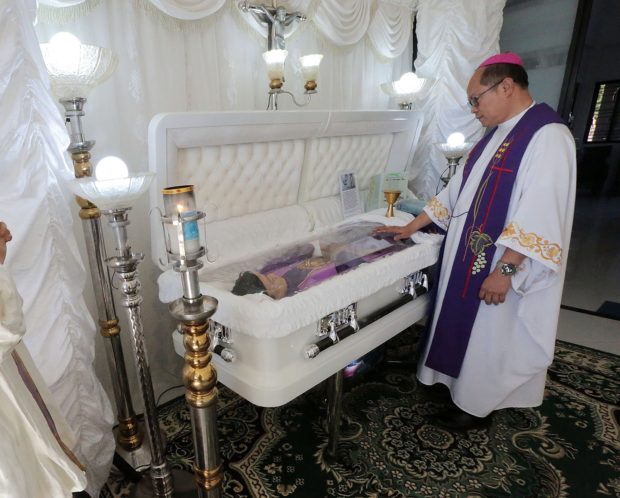
PRAYER FOR PRIEST Lingayen-Dagupan Auxillary Bishop Elmer Mangalinao offers a prayer for slain priest Marcelito Paez during the wake at Bahay Pari in Baloc, Santo Domingo, Nueva Ecija province. —GRIG C. MONTEGRANDE
The Commission on Human Rights (CHR) has opened an investigation into increasing killings in the government’s counterinsurgency campaign.
Human Rights Commissioner Jose Luis Martin Gascon told the Inquirer on Tuesday that the CHR-Calabarzon office had deployed a team to investigate the Nov. 28 clash between government troops and suspected New People’s Army (NPA) rebels at Nasugbu town, in Batangas province, that left 15 people dead, including five women, one of whom was a student activist from the University of the Philippines.
Gascon said a team from the CHR central office also had been sent to Nueva Ecija province to investigate the killing of retired Catholic priest Marcelito Paez, 72, on Monday night, hours after he helped secure the release from military custody of an organizer for the left-leaning peasant group Alyansa ng Magbubukid sa Gitnang Luzon.
Gascon did not mention the killing of religious leader Lovelito Quiñones, 57, in a clash between government troops and suspected NPA rebels in Oriental Mindoro on Sunday, but human rights group Karapatan has asked the CHR to look into Quiñones’ death and the killing of activists in the government’s counterinsurgency operations, which have intensified since the collapse of peace talks between the Duterte administration and the National Democratic Front of the Philippines (NDFP), the political arm of the Communist Party of the Philippines (CPP).
Shoot on sight
Karapatan blames the killings on the military, which President Duterte has ordered to shoot NPA rebels on sight, promising troops that he has their back.
Mr. Duterte also has declared the CPP and the NPA terrorist organizations.
“We’ll continue to monitor events as they unfold,” Gascon said. “Every incident that results in violent clashes is something of concern to anyone, certainly us.”
Gascon said the CHR was investigating “without making any prejudgments.”
“In the context of armed conflict, where you have two sides that are both armed, there are established norms . . . that must be complied with and we need the cooperation of everyone who knows about the facts to determine if international humanitarian law was complied with or not,” he said.
“There were allegations [of] excessive use of force and violence and attacks on noncombatants, and these are some things we would like to be able to clarify,” he added.
Return to negotiations
Gascon said the CHR was “worried” that there might be an “intensification” of clashes between government forces and communist rebels with the collapse of the peace negotiations.
He said both sides should adhere to agreements reached involving human rights and “do everything to return to negotiations so that we can hope to diminish the violence.”
Karapatan blamed the recent killings on the “Duterte regime’s fascist policies and pronouncements.”
“We condemn Duterte and his fellow bloodthirsty cohorts in the military, police and Cabinet … for masterminding these policies, foremost [of which is] this regime’s counterinsurgency program ‘Oplan Kapayapaan,’ which has instigated these attacks,” Karapatan secretary general Cristina Palabay said in a statement on Tuesday.
“Duterte and his team of bloodthirsty beasts are setting a new threshold for state terror,” Palabay added, noting that 10 activists were killed in just two days.
Karapatan cited initial reports of possible human rights violations, noting “the number of casualties” and “the manner [by which] they were killed.”
104 political killings
“[Just] more than a year in power, the Duterte government has claimed 104 lives in political killings, mostly farmers. There are 449 political prisoners languishing in jails; there are hundreds of people in communities under constant threat of militarization, harassment and food blockade,” said Roneo Clamor, deputy secretary general of Karapatan.
Speaking at the wake for Paez on Tuesday night, Bishop Roberto Mallari of the Diocese of San Jose, in Nueva Ecija, said the government and all other sectors should be concerned about the killing of Quiñones and “all other killings that include children and [elderly people.]”
“Human lives are important, be they very old [or] very young, suspected rebels, soldiers, activists, suspected illegal [drug] pushers and users,” Mallari said.
“They should not be [just] statistics in the [problems that] our country is going through,” he said. —With reports from Anselmo Roque and Tonette Orejas